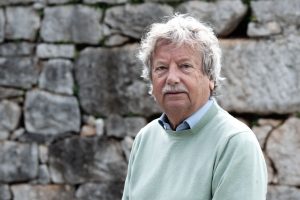Marij Čuk
Marij Čuk (Trieste, 1952) is a poet, writer and playwright, author of radio dramas and satirical serials, as well as a theatre critic, essayist, columnist and screenwriter. A graduate of the Faculty of Arts in Ljubljana, he was a professor in Trieste and Gorizia, as well as a journalist at Primorski dnevnik and director of the Slovenian news programme at RAI. His literary interest is rooted in the idea that the local is global: he tackles the world and the human being in it through the fate of a minority ethnic community, because we are all just minorities, squeezed into a narrow niche of existence by military, economic and political superpowers. Čuk’s works have been translated into several languages, and he has received many awards, such as the Resurrection Prize, the IzBeremo Prize, the Special Prize of the Municipality of Dolina, the Lord Byron Prize and the Nabokov Prize. His most recent novels are Črni obroč (2020; The Black Ring, about the burning of the National Palace in Trieste in 1920) and Fojba (2013; Foiba, a literarised depiction of the difficult inter-war and post-war period, exploring the causes and consequences of violence). Čuk’s most recent collections of poetry are Ko na jeziku kopni sneg (2014; When the Snow Melts On the Tongue), Molk koloradskih hroščev (2016; The Silence of the Colorado Potato Beetle), Prah (2018; dust), as well as the bilingual anthology Alle Fugen der Liebe / Vse gube ljubezni (2022; All the Joints of Love), translated by Horst Ogris. Marij Čuk spent a large part of his life in his home village of Dolina. Today he lives overlooking the Gulf of Trieste near Ferlugi, in the tranquillity of the Karst.
Gašper Kralj
Gašper Kralj (Ljubljana, 1974) is a writer and translator. He has been involved in activism, both in Slovenia (e.g., in connection with the Postojna Centre for Foreigners) and in Mexico and Guatemala, where he conducted research for his doctoral dissertation in Social Anthropology. The work was published as a monograph, The Disappeared and the Returned: Testimonials on the Uprisings in Guatemala and Latin America (Založba /*cf., 2008). He lived in Catalonia for a few years, translating Spanish authors (Javier Cercas, Eduardo Galeano, Ernesto Sábato, Carlos G. Villa), researching literary fiction and writing the novel Rok trajanja (2016; Expiry Date). Published by Založba /*cf. publishing house in 2016, a Hungarian translation (by Emese Rajsli) came out in 2021, and a German translation (by Alexander Rath) in 2023. For his second novel, Škrbine (2020; Stubs), he won the Cankar Prize for the best original work of literature, and was shortlisted for the European Union Prize for Literature and the Kresnik Award. Škrbine will also be published in German (translation by Felix Mayer and Jernej Biščak). Kralj has been a guest at international literary meetings and festivals in Budapest and Kiel. With his co-translator Tina Malič, he has been nominated twice for the esAsi Prize, for the translation of Javier Cercas’s Soldiers of Salamis (Založba /*cf., 2013) and Eduardo Galeano’s Children of the Days (Sanje, 2014).


